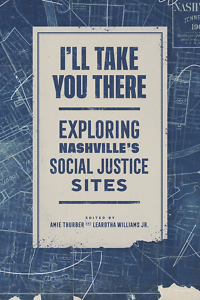Our Town
I’ll Take You There is a collaborative guide to places in Nashville shaped by social justice work
When co-editors Amie Thurber and Learotha Williams Jr. envisioned I’ll Take You There: Exploring Nashville’s Social Justice Sites, they had in mind a non-traditional travel guide along the lines of the University of California Press’ A People’s Guide Series. Those guides, edited by three female geographers, tell the lesser-known stories of how most residents actually experience their cities, highlighting places shaped by grassroots resistance to power and struggles for justice.

Thurber was a Ph.D. candidate in the Community Research and Action program at Vanderbilt when she and some colleagues got their hands on A People’s Guide to Los Angeles from that series. The book inspired them to do something like it for Nashville, but they wanted it to be more a shared project with the city’s residents than an academic work. The planning team asked local scholars and activists to suggest what stories needed to be told and who should tell them, then spent three years collecting material. “What was most exciting to me was the deeply democratic, collaborative process of trying to create opportunities for people to author their own place stories,” says Thurber, who went from team member during the idea phase to the book’s eventual co-editor.
Thurber had an ideal editorial partner in Learotha Williams Jr. associate professor of African American and public history at Tennessee State University. He was already doing similar work as coordinator of the North Nashville Heritage Project, which collects oral histories and artifacts from the city’s African American community, historically centered in North Nashville. Williams launched the project in 2010, after moving to Nashville to join the TSU faculty. He visited churches, barbershops, and eateries and asked people to tell him stories. “We were focusing on marginalized voices, people that had been either removed or had disappeared from the narrative of the community,” he says.
Williams viewed the alt-guide to Nashville as another channel for sharing what he’d learned about the city. But more importantly, to him, it “gave the people an opportunity to tell their stories, to reveal their truths,” he says. As an educator, he’d seen how powerful the experience was for his students when they learned history directly from the people who lived it — and for the witnesses themselves when they were heard and acknowledged. Indeed, more than 100 contributing writers — including longtime local activists, social justice organizers, historians, and business owners — added their voices to I’ll Take You There, telling stories that for them are often deeply personal. The Tent City entry was co-written by Wendell Segroves, a homeless advocate and former inhabitant of the camp. A piece about the Nashville Fairgrounds and MLS stadium redevelopment debate — fraught with issues of race and class — was co-authored by Odessa Kelly, community activist and executive director of Stand Up Nashville.

One of the most prolific contributors was the late Kwame Lillard, a Nashville civil rights icon, Freedom Rider, and former city councilman. Lillard wrote the Centennial Park sidebar that tells of a hot July day in 1961 when he made history by seeking entry to the public pool. “Little did we know that the city would rather prohibit all of Nashville from swimming than let us swim that day,” he writes.
“Kwame was our gladiator,” says Williams, who was heartbroken that Lillard did not live to see the book’s release. “This book would have been important to him … to see his [byline] at the end of the story.”
At first glance, I’ll Take You There is organized like a typical guidebook, with sections divided by regions of the city and surrounding counties and key sites marked on maps. But the opening pages make it clear that this is no typical guide. The introduction interrogates the city’s defining mythologies: Can Nashville really be an “It City” if its growth and prosperity exclude so many? How could a true “Music City” decimate a Black musicians’ mecca like Jefferson Street by blasting an interstate highway through it? Similar inquiries cast doubt on the unexamined tropes of “Southern Hospitality” and “Athens of the South.”
 But this extraordinary guide is not a takedown of all that Nashvillians hold dear; if anything, it nurtures a deepening of faith that comes with understanding the full story of a place. Uncovering histories that tourism boards and boosterish guides gloss over is part of Vanderbilt University Press’ commitment to publishing books about civil rights, Southern music, and modern urbanism, says VUP marketing manager Betsy Phillips. “Considering Nashville history,” she says, “it makes sense to publish more books that look at those interests playing out in our own home town.”
But this extraordinary guide is not a takedown of all that Nashvillians hold dear; if anything, it nurtures a deepening of faith that comes with understanding the full story of a place. Uncovering histories that tourism boards and boosterish guides gloss over is part of Vanderbilt University Press’ commitment to publishing books about civil rights, Southern music, and modern urbanism, says VUP marketing manager Betsy Phillips. “Considering Nashville history,” she says, “it makes sense to publish more books that look at those interests playing out in our own home town.”
The book shares its title with the Stax soul hit by The Staple Singers, a phrase that evokes the feeling of sidling up to a local and asking what to see. As the introduction explains, “The colloquial use of ‘I’ll take you there’ has long been a response to the call of a stranger: for recommendations of safe passage through unfamiliar territory, a decent meal and place to lay one’s head, or perhaps a watering hole or juke joint.”
Thurber sees this guide as a chance for native Nashvillians to honor their history and for new residents to fulfill their civic responsibility to know where they live and what to preserve. Williams hopes visitors and natives alike will let the book carry them to places “that don’t get as much shine, that don’t appear in our magazines, where one can listen to good music, or dance, or just find a cool spot to read” — and maybe have an unforgettable experience along the way, much like his own experience of learning about his adopted city by gathering testimony.
“This project was fueled by a deep and profound love for the people of this city, I mean people who oftentimes were voiceless,” he says. “It was an act of love, an act of hope, an act of faith. Hope that this city can recognize and do better by some of its residents, and faith in the people who have shared their stories — faith that they will accomplish justice in their lifetimes.”
[Read an excerpt from I’ll Take You There and see selected images from the book here.]

Kim Green is a Nashville writer and public radio producer, a licensed pilot and flight instructor, and the editor of PursuitMag, a magazine for private investigators.


